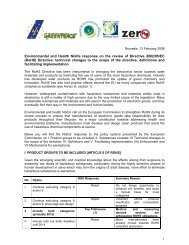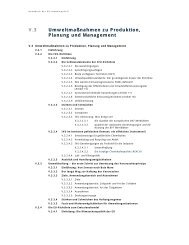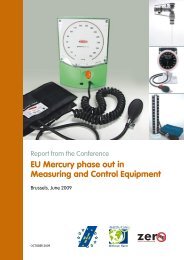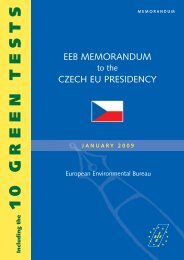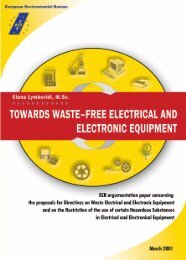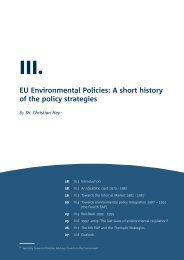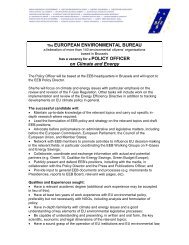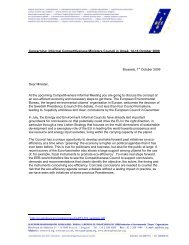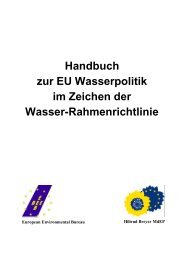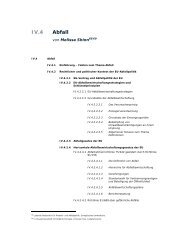EMAS III - European Environmental Citizens Organisation for ...
EMAS III - European Environmental Citizens Organisation for ...
EMAS III - European Environmental Citizens Organisation for ...
Create successful ePaper yourself
Turn your PDF publications into a flip-book with our unique Google optimized e-Paper software.
or in a way that may create confusion with environmental product labels” 16 . Regrettably this<br />
<strong>for</strong>mulation does not offer an answer to the question of who will decide what ‘may create<br />
confusion’? Should the decision be left to the industry alone, it will be easy to <strong>for</strong>esee what<br />
the result will be and the provisions will likely be used to falsely claim environmental<br />
excellence of products where there is none (<strong>EMAS</strong> does not even ensure excellence with<br />
respect to direct environmental effects of organisations).<br />
Following from this, ANEC, ECOS and EEB stress that the use of the <strong>EMAS</strong> logo on<br />
products or in connection with product in<strong>for</strong>mation/advertising must be strictly prohibited.<br />
PROMOTION, INCENTIVES<br />
The Commission proposal suggests several measures to make <strong>EMAS</strong> registration more<br />
attractive <strong>for</strong> organisations. These include promotion activities by Member States, particular<br />
incentives <strong>for</strong> small organisations, pushing <strong>EMAS</strong> by embedding the scheme in other<br />
legislation, providing <strong>for</strong> financial subsidies (e.g. reduced taxes), and exempting<br />
organisations from, or reducing, the legal obligations. Article 35 of the proposal goes even so<br />
far as to suggest that the advertising should involve “industrial associations, consumer<br />
organisations, environmental organisations, trade unions and local institutions”.<br />
ANEC, ECOS and EEB must underline that any advertising or incentives <strong>for</strong> a system which<br />
is doubtful in terms of its environmental benefit, and which can be regarded as a <strong>for</strong>m of<br />
marketing rather than a sound environmental policy instrument - at the expense of the<br />
taxpayer - is not acceptable. Hence any incentive must be linked to per<strong>for</strong>mance<br />
achievements rather than be based on mere registration to the scheme. Similarly, regulatory<br />
reliefs should only be acceptable if the system has been made much more demanding than<br />
is currently the case.<br />
A new element in the <strong>EMAS</strong> <strong>III</strong> proposal is the attempt to allow organisations outside the EU<br />
to register in a Member State of their choice. However, it will be very difficult to assess legal<br />
compliance and the environmental achievement of an organisation outside the EU. Hence,<br />
we do not believe it to be possible to have a credible <strong>EMAS</strong> if the scheme is extended to<br />
organisations outside the EU.<br />
Finally, ANEC, ECOS and EEB question a stepwise approach to <strong>EMAS</strong> as the scheme does<br />
not stipulate stringent requirements, so establishing a ‘weaker brother’ of a weak system<br />
seems futile. Moreover, we must express our objections to the provisions which would allow<br />
recognition of other existing management systems – thus potentially undermining the<br />
crediblility of <strong>EMAS</strong> even further. In our view allowing such practice would be diametrically<br />
opposed to the idea of <strong>European</strong> harmonisation.<br />
16 Article 10(4) of new <strong>EMAS</strong> proposal (COM(2008) 402/2<br />
8



